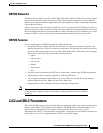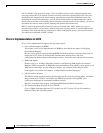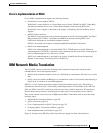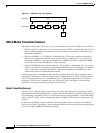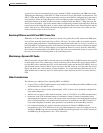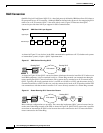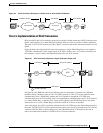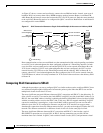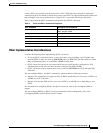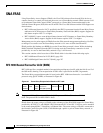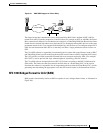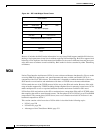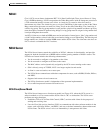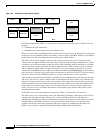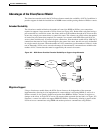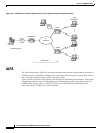
Overview of IBM Networking
IBM Network Media Translation
BC-225
Cisco IOS Bridging and IBM Networking Configuration Guide
circuits (PVCs) are available, but the favored use is SVC. While the router maintains a permanent
connection to the X.25 network, a remote device can use each SVC for some bounded period of time and
then relinquish it for use by another device. Using a PVC is very much like using a leased line.
Table 3 shows how the QLLC commands correspond to the SDLLC commands.
Other Implementation Considerations
Consider the following when implementing QLLC conversion:
• To use the QLLC conversion feature, a router must have a physical link to an X.25 public data
network (PDN). It must also have an SRB/RSRB path to an IBM FEP. This link could be a Token
Ring or Ethernet interface, or even FDDI, if RSRB is being used.
• QLLC conversion can run on any router with at least one serial interface configured for X.25
communication and at least one other interface configured for SRB or RSRB.
• QLLC conversion security depends upon access control in SRB/RSRB and X.25 and upon XID
validation.
You can configure DLSw+ for QLLC connectivity, which enables the following scenarios:
• Remote LAN-attached devices (physical units) or SDLC-attached devices can access an FEP or an
AS/400 over an X.25 network.
• Remote X.25-attached SNA devices can access an FEP or an AS/400 over a Token Ring or over
SDLC.
For information on configuring DLSw+ for QLLC conversion, refer to the “Configuring DLSw+”
chapter.
You can configure DSPUs for QLLC. For more information on this configuration, refer to the
“Configuring DSPU and SNA Service Point” chapter.
Table 3 QLLC and SDLLC Command Comparison
QLLC Command Analogous SDLLC Command
qllc largest-packet sdllc ring-largest-frame, sdllc
sdlc-largest-frame
qllc partner sdllc partner
qllc sap sdllc sap
qllc srb, x25 map qllc, x25 pvc qllc sdllc traddr
qllc xid sdllc xid
source-bridge qllc-local-ack source-bridge sdllc-local-ack



